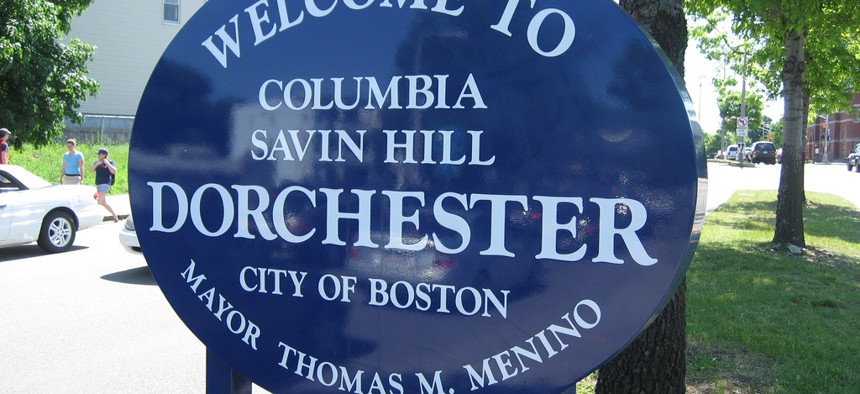Former Mayor’s Name Lingers All Over Boston

Former Boston Mayor Thomas M. Menino left his mark all over town. Flickr user Adam Pieniazek
When mayors put their stamps on cities, their legacies often remain physically.
It’s hard to deny that Thomas M. Menino, a larger-than-life figure in Boston politics who served as mayor for 20 years, left his stamp on the city. Going around town, it’s easy to spot instances of his physical name remaining on city signs seven months after he left office.
Boston.com recently asked the office of current Mayor Marty Walsh what the timeline was to replace the outdated Menino signs. Walsh’s office, according to his press secretary, is not in a hurry to replace the Menino signs since city resources can be spent in better ways. Additionally, there’s no central sign database with the locations of all the Menino-branded signs, so there’s no effective way to launch a rapid sign-changing operation.
Menino’s name footprint is far-reaching. Boston magazine found at least 1,182 Menino-branded signs around the city last year. (The former mayor was diagnosed with cancer earlier this year and started chemotherapy in March.)
Sign-changing and name-changing issues are common in many cities and states when there’s a shift in administration. They’re easy to criticize as a waste of local resources.
In Chicago, former Mayor Richard M. Daley’s name lingered on city signs much like Menino’s in Boston. "I actually did send a message out, I don't want time wasted changing a bunch of signs and wasting taxpayers' dollars," current Mayor Rahm Emanuel said in 2011, according to The Associated Press.
When Pennsylvania Gov. Tom Corbett took office in 2011, he maintained a practice started by then-Gov. Ed Rendell to keep the sitting governor’s name off welcome signs. In 2004, Rendell, according to Allentown’s Morning Call, had state crews cover up his name on state welcome signs and replaced them with the state slogan, “State of Independence.” In 2012, a state representative even introduced legislation that would prohibit the Pennsylvania governor’s name on welcome signs, according to the newspaper.
Earlier this year in South Florida, the Hialeah City Council approved legislation to remove the name of a former mayor from city hall, according to The Miami Herald. The council had previously OK’d an ordinance barring future municipal building renamings for living officials or their relatives.
Sign removal or name changing can be touchy subject depending on the official being honored.

(Photo of former D.C. Mayor Marion Barry by Flickr user Tom Bridge using an Attribution-NoDerivs 2.0 Generic Creative Commons license)
In 1991, the District of Columbia then-mayor, Sharon Pratt Kelly, made a concerted effort to remove former Mayor Marion Barry’s name from signs around the nation’s capital and even appointed someone to oversee a special signage and graphics task force, according to Washington City Paper.
Barry, who had been arrested and convicted of drug possession during his third term as mayor, was angry with his successor’s name-changing operation. In the case of one municipal building, the Frank Reeves Center, Barry took corrective action when he successfully ran for a fourth term as mayor after his release from prison.
From “Mayor for Life,” Barry’s recently released autobiography:
“I felt it was a misdirection of energy and a shot at my legacy in Washington. You can’t remove a person’s name like that. There’s one argument to disagree with how a person ran the city, but it’s another argument to slight a city leader personally. I felt that taking my name down from a city project that I was totally responsible for developing was blatantly disrespectful. So after she took my name down from the Reeves Center building, when I got back into office, I put my name right back up. I was not going to allow anyone to erase my history in the District.”
Barry, who today is a member of the D.C. Council, can still point to his name on the side of the Reeves Center, where it remains, for now. The Reeves Center is part of a controversial proposed land swap involving a development deal that would pave the way for the construction of a new soccer stadium and see the municipal building relocated to to Barry’s home ward.
“I’m thoroughly, 100 percent, 1,000 percent supportive of it,” Barry told Washington City Paper last year.
(Photo of a Boston neighborhood sign with Menino's name by Flickr user Adam Pieniazek via a Creative Commons Attribution Generic 2.0 license)
NEXT STORY: Pensioners in Bankrupt Detroit OK Tough Cuts






